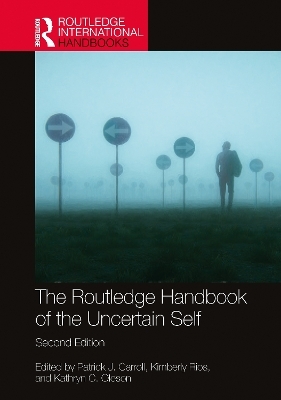
The Routledge Handbook of the Uncertain Self
Routledge (Verlag)
978-1-032-42591-7 (ISBN)
- Noch nicht erschienen (ca. Februar 2025)
- Versandkostenfrei
- Auch auf Rechnung
- Artikel merken
Featuring chapters written by distinguished scholars from a range of disciplines in psychology, the book explores the similarities and differences between personal uncertainty and other psychological experiences in terms of their nature and relationship with human thought, emotion, motivation, and behavior. It takes an interactionist perspective to examine what social and personality psychology knows about the experience of self-uncertainty in its various forms, exploring its determinants and consequences within and across individuals and groups. The new edition has been extensively revised and updated and includes new material on self-uncertainty within intimate relationships, in groups, and within spiritual and educational contexts. There is also new content on conspiratorial thinking as well as on the uncertain self within the broader context of uncertainty associated with the COVID-19 pandemic. Throughout, strategies specifically designed to assist others in confronting the unique challenges posed by self-uncertainty in ways that emphasize healthy psychological functioning and growth are promoted.
Featuring cutting-edge theory and research on the determinants, experiences, and consequences of uncertainty in the self, the handbook is an invaluable resource for researchers, practitioners, and senior undergraduate and graduate students in social and personality psychology, clinical and counseling psychology, educational psychology, and developmental psychology.
Patrick J. Carroll is Professor of Psychology at The Ohio State University-Lima in the United States of America. Kimberly Rios is Professor of Psychology at The University of Illinois-Urbana Champagne in the United States of America. Kathryn C. Oleson is Professor of Psychology at Reed College in the United States of America.
About the editors
List of contributors
Preface
INTRODUCTION
Chapter 1: Introduction
Kim Rios, Kathryn C. Oleson, and Patrick J. Carroll
PART I. META-COGNITION & UNCERTAINTY IN SELF
Chapter 2: Multiple Effects of Discarding Thoughts through Invalidation: Attenuation, Elimination, Reversals, and Compensation
Pablo Briñol and Richard Petty
Chapter 3: The Case of Confidence in Eyewitness Testimony
Kyros Shen, Allan Lam, & John Wixted
Chapter 4: Be Careful What You Wish For: The Dark Side of Freedom
Nate Cheek and Barry Schwartz
Chapter 5: Antecedents and Consequences of Identity:
A Meta-Cognitive Model
Borja Paredes, Pablo Briñol, and Richard Petty
Chapter 6: Self-Uncertainty as Cause and Consequence of Possible Self-Revision
Patrick J. Carroll, Radhika Kothari, and Rease Haley
Chapter 7: The Social Psychology of Fairness and the Regulation of Personal Uncertainty:
Implications for Understanding the Role of Trust in Society
Kees van den Bos and E. Allan Lind
Chapter 8: An Antidote to Self-Uncertainty: Nostalgia Prevents Self-Uncertainty from Lowering Self-Continuity
Constantine Sedikides, Marios Biskas, Jacob Juhl, and Tim Wildschut
Chapter 9: Jumping to Conclusions
Carmen Sanchez, Steffen Moritz, and David Dunning
Chapter 10: Inauthentic or Merely Uncertain:
When do People Tolerate Situations of Identity Misfit?
Yingchi Guo and Toni Schmader
PART II: MOTIVATION and UNCERTAINTY IN SELF
Chapter 11: Why is Existential Uncertainty Distressing and Persistent? A Terror Management Perspective
Mark Landau, Young Ju Ryu Jeff Greenberg, Marcus Chur, and Tom Pyszczynski
Chapter 12: The Integrated Causal Uncertainty Model
Jae-Eun Namkoong, Marlone Henderson, and Stephanie Tobin
Chapter 13: Toward Love or Hate and Meaning Either Way:
From Anxious Uncertainty to Proactive or Reactive Approach Motivation
Ian McGregor and Denise C. Marigold
Chapter 14: Prototypicality Threat and Self-uncertainty Motivate Group Behavior
Olivia Kuljian and Zachary Hohman
Chapter 15: The Uncertainty Surrounding Ostracism: A Systematic Review and Future Directions
Zhansheng Chen, Fiona Yunqian Tian, Andrew Hales, and Kipling Williams
Chapter 16: Certainty through Social Connection? Protecting the Self in an Uncertain Social World
Sandra Murray
PART III: CLINICAL and APPLIED IMPLICATIONS OF THE UNCERTAIN SELF
Chapter 17: Social Identity Uncertainty and COVID-19
Erica Molinario, Molly Ellenberg, and Laura Prislie
Chapter 18: When Political and Religious Belief Systems Conflict
Kimberly Rios and Alexis Morales
Chapter 19: Managing Acute Uncertainty
Kate Sweeny and Jennifer Howell
Chapter 20: The Unsettled Questions of Belonging Uncertainty
Shannon Brady, Gregg Muragishi, and Rebecca Getu
Chapter 21: Doubt as a Form of Spiritual Struggle
Julie Exline, Yehudis Keller, Andrew C. Moffitt, and Kenneth I. Pargament
General Commentary
Chapter 22: Michael Hogg
| Erscheint lt. Verlag | 25.2.2025 |
|---|---|
| Reihe/Serie | Routledge International Handbooks |
| Zusatzinfo | 14 Line drawings, black and white; 3 Halftones, black and white; 17 Illustrations, black and white |
| Verlagsort | London |
| Sprache | englisch |
| Maße | 174 x 246 mm |
| Themenwelt | Geisteswissenschaften ► Psychologie ► Psychoanalyse / Tiefenpsychologie |
| Geisteswissenschaften ► Psychologie ► Sozialpsychologie | |
| Mathematik / Informatik ► Mathematik | |
| ISBN-10 | 1-032-42591-1 / 1032425911 |
| ISBN-13 | 978-1-032-42591-7 / 9781032425917 |
| Zustand | Neuware |
| Informationen gemäß Produktsicherheitsverordnung (GPSR) | |
| Haben Sie eine Frage zum Produkt? |
aus dem Bereich


